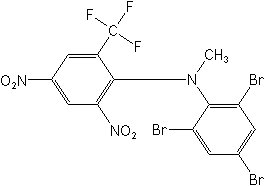Molecular formula for Bromethalin

Choteau veterinarian Kristin Boroff is adding her warning to a chorus of veterinarians nationwide who are seeing an increase in fatal accidental poisonings of pets who have ingested new-generation rodent killers that contain a lethal neurotoxin.
Last week Boroff, who practices at the Double Arrow Veterinary Clinic, said she has recently treated two dogs that had ingested a rodenticide containing the neurotoxin “bromethalin.”
Bromethalin poisoning causes lethargy, staggering, dilated pupils, trembling, seizures and death. This poison causes sodium to build up in the animal’s brain. The subsequent swelling causes death.
Traditional rodenticides — poisons used to kill mice, rats and other rodents — used anticoagulants, drugs that prevent blood from clotting, causing animals to bleed to death internally.
Boroff said veterinarians could easily administer an antidote — vitamin K — to save pets from accidental anticoagulant poisoning, but there is no quick and easy antidote for bromethalin.
Time is critical in a bromethalin poisoning case, she said, with pet owners needing to immediately bring their pet to a veterinarian if poisoning is suspected. The veterinarian can try to induce vomiting and administer activated charcoal to neutralize further absorption of the poison in the animal’s stomach.
But, she said, by the time the pet starts exhibiting symptoms, saving its life becomes very difficult and veterinarians are seeing a high rate of mortality.
“Just check your rat poison if you’re putting it out and make sure it doesn’t have bromethalin in it,” Boroff said.
In the two cases she has treated, the pet owners had purchased new rodenticide and were unaware of the change in active ingredients. They were able to bring their pets in immediately and stop the poisoning process early.
Fall is the time of year when many homeowners start putting out mouse poison to clean out sheds, trailers, etc., before they are put into winter storage. This particular type of poison comes in small blocks that not only attract rodents but also are attractive to dogs in particular. Cats can also be poisoned and are much more sensitive than dogs to the neurotoxin.
According to the Pet Poison Helpline (www.petpoisonhelpline.com), bromethalin’s toxicity level ranges from moderate to severe, depending on the amount ingested, the time of ingestion and the concentration of the product.
Another veterinarian, Dr. Karen Becker, who writes a column on the Healthy Pets’ website, says rodenticide manufacturers are switching from anticoagulants to neurotoxins because of a 2008 directive from the Environmental Protection Agency. The EPA directed manufacturers to phase out the long-acting anticoagulants for residential use by 2011 in an effort to make rodenticides safer around children, pets and wildlife.
In complying with the directive, manufacturers switched from anticoagulants to neurotoxins, but the change is bringing with it an unintended consequence — pets are still being poisoned, but now there is no quick-acting, reliable antidote. Dr. Ahna Brutlag, a diplomate of the American Board of Toxicology and assistant director or veterinary services for the Pet Poison Helpline, said in a Web article, “We feel like it was well-intentioned but we’ve ended up with some really frightening consequences. With anticoagulants, at least we know there is a very effective test and there’s an antidote.”
Dr. Becker says one manufacturer, d-Con, has refused to comply with the new regulations and is still using an anticoagulant as its active ingredient. She says the Pet Poison Helpline and d-Con have asked the EPA to revise the 2008 directive because there is no known antidote.
In the meantime, Dr. Boroff encourages pet owners to check the label on rodenticides and make sure they are still using a product that contains an anticoagulant such as brodifacoum, bromadiolone, difethialone and difenacoum, for example.
Rodenticides should not be put in places that are accessible to pets or children, and pets should be monitored carefully for accidental poisoning when a pet owner has put out poison.
One way to avoid potential poisoning is to use live traps and relocate rodents to the countryside.
Pet owners can reach the Pet Poison Helpline 24 hours a day at 800-213-6680. Phone numbers of local veterinarians are: Double Arrow Veterinary Clinic, 466-5333, in Choteau; East Slope Veterinary Service, 466-3020, in Choteau; Kurt Johnson, DVM, 788-0700, in Bynum; and Clint Hilt, DVM, 463-2426, in Power.
– END-
